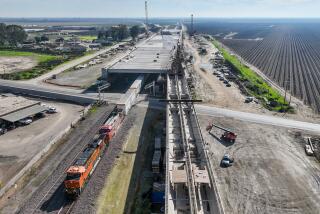Panel Urges City Control : State Park Plan for White Point Rejected
- Share via
A citizens advisory committee in San Pedro has voted against turning White Point into a state park, and is recommending instead that the 102-acre parcel be developed by the City of Los Angeles for a combination of recreational uses.
Most of the park, according to the committee’s recommendation, would be set aside for passive uses such as picnic areas and nature trails. A small portion of the park would be used for sports fields, although the committee members made it clear they want the park to be used only in the daytime, with no lighted fields.
The committee originally discussed setting aside 92 acres for passive uses and 10 acres for sports, but later settled on the less specific recommendation. A report drafted by committee Chairman Jerry Gaines, part of which was adopted by the committee Wednesday, also recommends the development of exhibits that focus on the park’s history as a former Nike missile base.
The 9-4 vote comes on the heels of a bitter debate in San Pedro over the future of White Point. One faction of the community insisted that the land, which sits atop a bluff overlooking the Pacific Ocean, should be turned over to the state for development of a park and nature preserve. Another faction has demanded that 35 acres of White Point be set aside for a sports complex.
Although Wednesday night’s vote is a compromise, the vote does not end the citizens advisory committee’s work. The committee will meet again in two weeks to discuss other recommendations in Gaines’ report regarding the development of other public lands for recreation in San Pedro.
One key factor in the committee’s decision against turning White Point over to the state was that state officials insisted the park have overnight camping. Several committee members were fiercely opposed to overnight camping.
The recommendation adopted by the committee Wednesday said that “the total park area is not large enough to provide for overnight camping that would be remote from adjacent residential areas. Neither the overnight visitors nor permanent residents could enjoy sufficient privacy from one another.”
But state park advocates on the committee argued that it is useless to keep the land in city hands because city officials have already said they have no money to develop the property.
Had the committee recommended giving the land to the state, the state would have also included nearby county and state beaches in its park. Some committee members, concerned about gang and drug problems at those beaches, saw giving the land to the state as a way to alleviate those problems because state parks have rangers on duty around the clock.
“You are trading off overnight camping for security,” said Goldie Otters, one of the four state park advocates. “Why should they offer security if there are no people there overnight?”
More to Read
Sign up for Essential California
The most important California stories and recommendations in your inbox every morning.
You may occasionally receive promotional content from the Los Angeles Times.

![Los Angeles, CA - May 19: Carlos Vargas, left, and Paulina Rubio, members of the harm reduction team from Homeless Outreach Program Integrated Care Systems [HOPICS], a leading homeless services and housing agency, look for drug addicts to help and pass out supplies at a homeless RV encampment along 77th St. in South Los Angeles Friday, May 19, 2023. The team hands out syringes, fentanyl test strips, overdose reversal nose spray and medication to prevent overdoses, infection and disease transmission, including the HIV virus. Fenanyl is particularly insidious because it can be found in all other drugs, especially meth and heroin. The handouts are also meant to reduce infection through broken pipes, which can cut users mouths and open them to infection. . (Allen J. Schaben / Los Angeles Times)](https://ca-times.brightspotcdn.com/dims4/default/530e2db/2147483647/strip/true/crop/3900x2608+0+34/resize/320x214!/quality/75/?url=https%3A%2F%2Fcalifornia-times-brightspot.s3.amazonaws.com%2Fe9%2F77%2F4b8bd35d4881a3edec6b945b143b%2F1298639-me-soaring-fentanyl-deaths-24-1-ajs.jpg)











